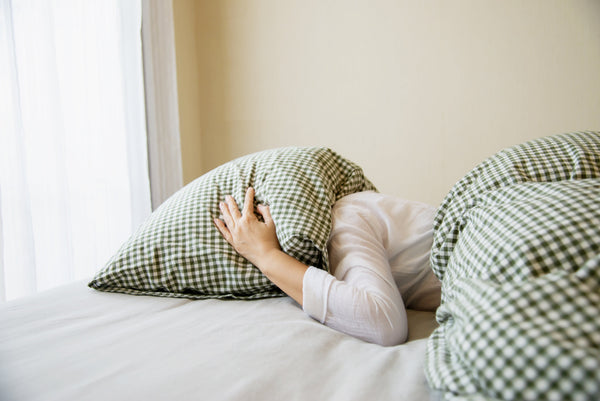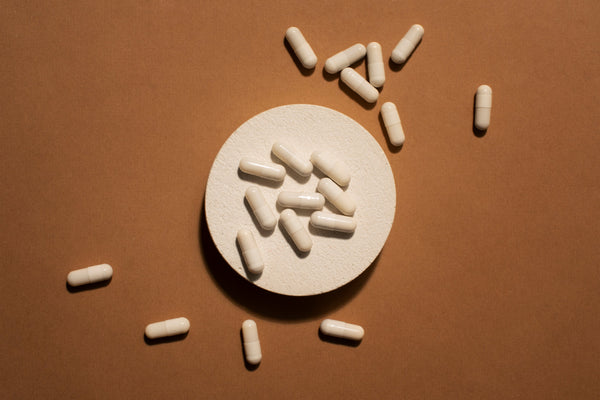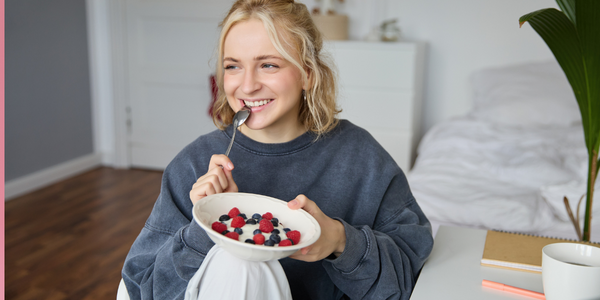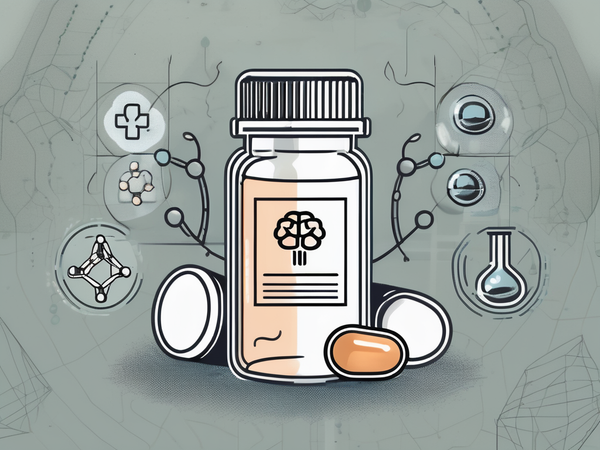Are you experiencing poor sleep quality lately and have tried different measures, but nothing seems to work? Perhaps, your food choices are to blame. Food and Sleep are two important things that most people love. The right kind of food and getting enough sleep are a must to maintain one’s healthy body. However, something that’s often overlooked by many is the intricate relationship between sleeping and eating.
This blog talks about how food impacts your sleep and what food items you should avoid to achieve better sleep. Along with that, you’ll find a natural supplement that helps enhance your overall sleep quality. So, read in full.
How Does Food Affect Your Sleep?
Diet and food choices help regulate our circadian rhythm. Our circadian rhythms keep our body clock running on time, which in turn keeps all of our bodily functions running on schedule — such as falling asleep at night, waking up in the morning, feeling hungry when we need energy and metabolizing the food we eat.
A 2011 study by Journal of Clinical Sleep Medicine states that eating less fiber, more saturated fat and more sugar throughout the day was linked with participants getting lighter, less restorative sleep, with more awakenings throughout the night. On the flip side, foods rich in fiber or unsaturated fats, such as nuts, avocados, fish, etc., may help promote good and sound sleep.
Therefore, you must eat the right food at the right time, keeping your sleep in mind. That is how it works. Here are some diet-related factors that affect your sleep: -
-
Tryptophan
There are some foods for that promote sleep and some preliminary studies have been done that support the claims. Tryptophan plays a role in the production of serotonin- a mood stabilizer and melatonin - which helps regulate sleep patterns, For e.g. Milk, Bananas, nuts, dark chocolate, milk contains tryptophan and berries contain some melatonin — which are some of the building blocks for the chemicals our brains need to make for sleep.
-
Caffeine
Caffeine whether it is via coffee, green tea or via diet coke can cause a havoc in our sleep cycle by blocking adenosine, a substance in your body that makes you feel sleepy. It makes us feel more alert by blocking production of the chemicals in the brain that tell our bodies to sleep and increasing adrenaline. This can make you more alert and give you a boost of energy which help in the morning but not when you are trying to go to sleep! Caffeine can stay in the bloodstream for up to six hours after you consume it, which is why nearly every sleep guideline you read suggests limiting caffeine in the afternoon and evening hours.
-
Alcohol
Alcohol can adversely affect your sleeping pattern. Drinking alcohol might feel relaxing for a short period, and it might also help you fall asleep. But, at night, it inhibits the sleep process and prevents you from getting deep and peaceful sleep.
-
Heavy Meals
Large meals before bed can disturb your sleep as it keeps your digestive system active for a long period. Overeating can also cause overall physical discomfort, which can be detrimental to proper sleep. It makes you feel too full and trigger acid reflux. After a heavy meal, the body dedicates energy to digest the food consumed. This process takes several hours. However, digestion is slowed down whenever we sleep, which forces your body’s normal sleep process to clash with the digestive process.
Therefore, if you want to have a large meal before sleeping, try to keep a good time gap between your meal and bedtime. It will allow your digestive system to do its work. Or, you can simply go for some light dinner if you plan to have food just before bed.
How Does Sleeping Pattern Affect Your Eating and Drinking Habits?
Sleep plays an essential role in regulating hormones including ghrelin and leptin. These two hormones are associated with our hunger and appetite, respectively. A significant lack of sleep produces more ghrelin, while leptin is decreased in the process. When this happens, we experience increased hunger and appetite.
When you are tired due to a lack of enough sleep, you tend to eat more and make wrong food choices, which leads to weight gain and obesity. You are more likely to go for highly processed foods or foods high in sugar and fats than healthy and nutrient-rich food options when you are sleep-deprived. That is why it is no surprise to know that inadequate sleep contributes to weight gain.
Here are Some Simple Tips to Keep in Mind when it comes to sleep and food: -
-
Avoid Alcohol Before Bedtime – Alcohol might provide deep sleep in the first few hours, but the sleep cycle rebounds. You will most likely stay awake or be in light sleep during the rest of the night. It will lead you to wake up less rested. Therefore, don’t drink too close to bedtime.
-
Avoid Spicy Or Fatty Food Items Near Bedtime – Heavy and spicy foods can lead to indigestion, making it pretty hard for you to sleep. So, save your hot wings for the daytime and eat lighter foods before bedtime.
-
Snack Wisely – While you must not stuff your stomach with heavy food, you must also not go with an empty stomach bed. A hungry stomach will keep you awake. Therefore, opt for foods at night that promote sleep but aren’t on the heavy side.
What Food and Drinks Would Help Improve Sleep?
Based on certain evidence, foods that help you get proper peaceful sleep are: -
-
Fresh fruits and vegetables.
-
Carbohydrate-rich foods like cereals, brown rice, oats, bread, etc.
-
Protein-rich food that consists of tryptophan. For example, chicken, tofu, turkey, milk, pumpkin, peanuts, etc.
-
Foods rich in Vitamins like A, C D, and K. For example, nuts like almonds, pistachios, walnuts, and cashews.
-
Cherries– Tart cherries are rich in melatonin, a sleep-inducing hormone. Consuming a glass of its juice can help in preventing insomnia and improve sleep efficiency.
-
Kiwi fruit- It is rich in serotonin, a chemical that regulates the sleep cycle.
-
Another thing you can do for a peaceful sleep is the Restful Sleep Melts. Let us learn in brief about these Melts.
What are Restful Sleep Melts?
If you have late-night work shifts, are jetlagged often, suffer from insomnia, or have trouble staying asleep, Restful Sleep Melts are for you. These thin oral strips calm your nerves, provide insomnia relief and aid your body’s natural processes to help you fall asleep peacefully.
Restful sleep melts consist of Passion Flower, L-theanine, Valerian root, Chamomile, Gamma-Aminobutyric Acid, and 5 – Hydroxytryptophan, that collectively work to regulate your sleep cycle. The Melts come in delicious and calming lavender and chamomile flavor.
This is completely non-habit forming and drug free formulation. Taking one Melts strip at least twenty minutes before bed is all you need for sound sleep.
Wrapping Up
Sleep and food are closely connected and affect each other. Therefore, you must adopt healthy eating and sleeping habits to maintain a balance between them. And if your sleep and diet are balanced and on the right terms, you will be healthier, fresh, and more energetic.
References
-
Crispim CA, Zimberg IZ, dos Reis BG, Diniz RM, Tufik S, de Mello MT. Relationship between food intake and sleep pattern in healthy individuals. J Clin Sleep Med. 2011 Dec 15;7(6):659-64. doi: 10.5664/jcsm.1476. PMID: 22171206; PMCID: PMC3227713. https://www.ncbi.nlm.nih.gov/pmc/articles/PMC3227713/
-
Richard DM, Dawes MA, Mathias CW, Acheson A, Hill-Kapturczak N, Dougherty DM. L-Tryptophan: Basic Metabolic Functions, Behavioral Research and Therapeutic Indications. Int J Tryptophan Res. 2009 Mar 23;2:45-60. doi: 10.4137/ijtr.s2129. PMID: 20651948; PMCID: PMC2908021. https://www.ncbi.nlm.nih.gov/pmc/articles/PMC2908021/
-
Stein MD, Friedmann PD. Disturbed sleep and its relationship to alcohol use. Subst Abus. 2005 Mar;26(1):1-13. doi: 10.1300/j465v26n01_01. PMID: 16492658; PMCID: PMC2775419. https://www.ncbi.nlm.nih.gov/pmc/articles/PMC2775419/
-
Edwards SJ, Montgomery IM, Colquhoun EQ, Jordan JE, Clark MG. Spicy meal disturbs sleep: an effect of thermoregulation? Int J Psychophysiol. 1992 Sep;13(2):97-100. doi: 10.1016/0167-8760(92)90048-g. PMID: 1399758. https://pubmed.ncbi.nlm.nih.gov/1399758/
-
Komada Y, Okajima I, Kuwata T. The Effects of Milk and Dairy Products on Sleep: A Systematic Review. Int J Environ Res Public Health. 2020 Dec 16;17(24):9440. doi: 10.3390/ijerph17249440. PMID: 33339284; PMCID: PMC7766425. https://www.ncbi.nlm.nih.gov/pmc/articles/PMC7766425/
-
Lin HH, Tsai PS, Fang SC, Liu JF. Effect of kiwifruit consumption on sleep quality in adults with sleep problems. Asia Pac J Clin Nutr. 2011;20(2):169-74. PMID: 21669584. https://pubmed.ncbi.nlm.nih.gov/21669584/

























